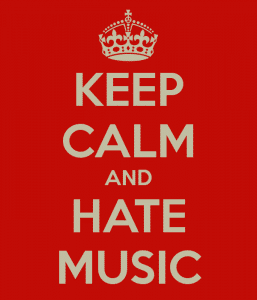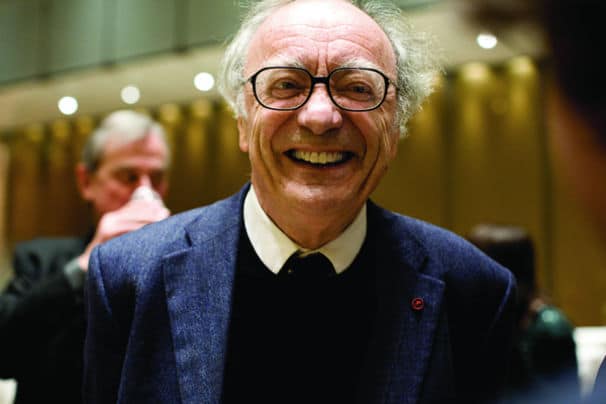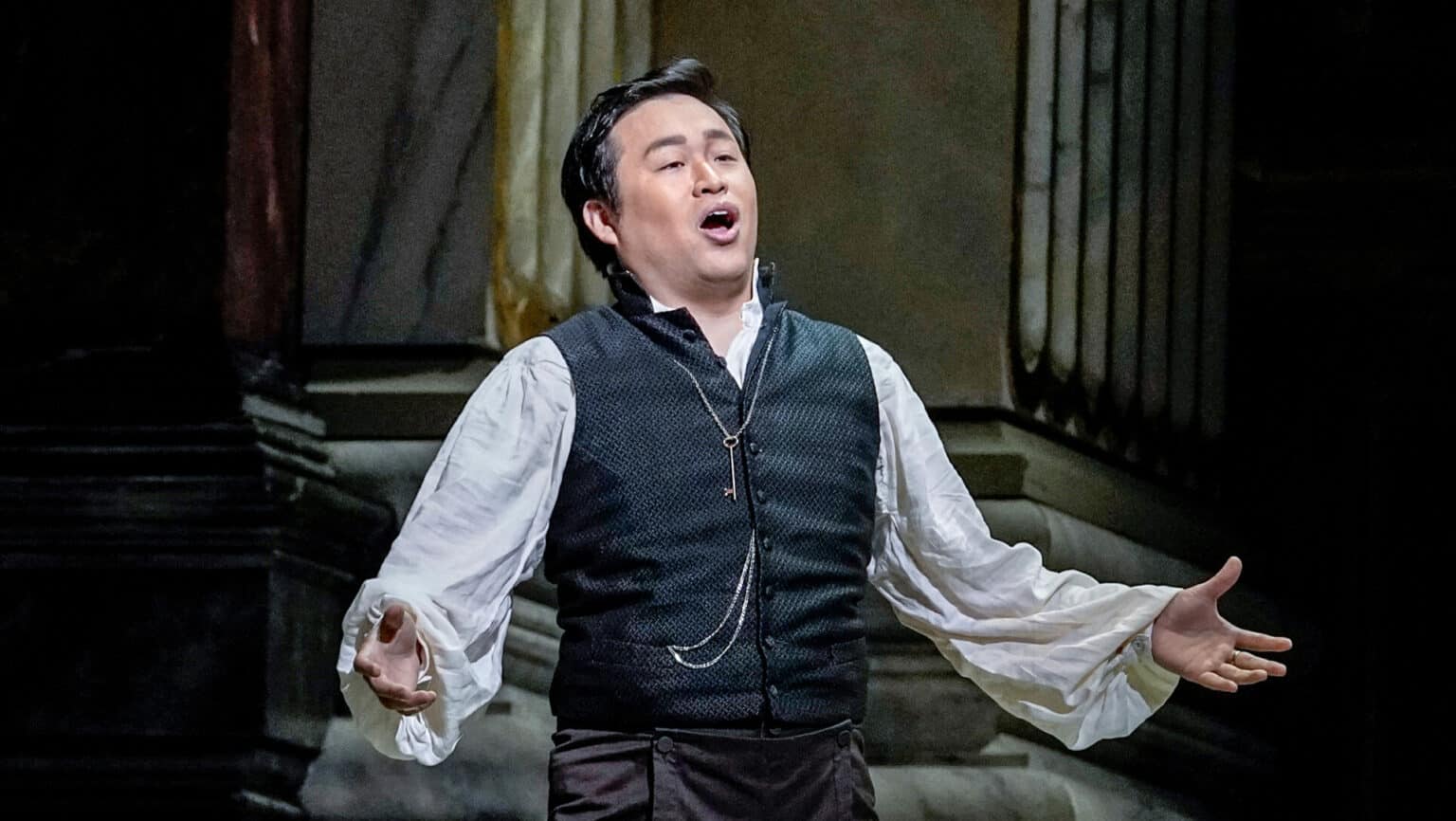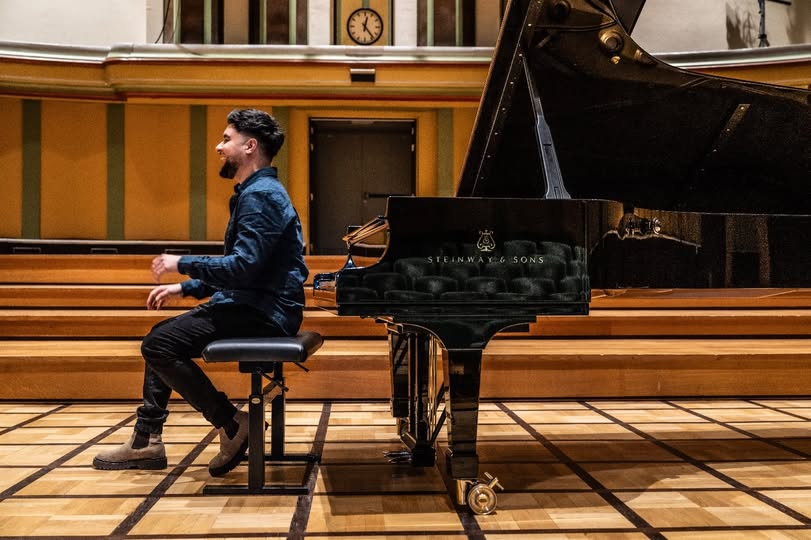Young educated Americans are ‘more likely’ than ever to dislike classical music
mainA study by two researchers at the University of Notre Dame has come up with some seriously bad findings.
A sampling of 2,250 Americans were asked to rank 15 genres of music as liked, disliked, or ‘mixed feelings’.
The replies were then compared to a similar survey from 1993.
The key finding is this: Today’s highly educated young – ‘high-status newcomers”, in the jargon – tend to dislike Classical music and Rock more than those of 1993.
In the first survey only 8 percent marked ‘dislike’ against classical music. Today (the survey is dated 2012) than number rises to 15 percent.
In general, dislike of classical music across all ages has slightly declined, but among the most desirable target group for music planners young people really hate what they consider to be their parents’ music and choose rap as an alternative.







Did this study bunch all classical music together as one single “style”, as usual? “Classical music” is as much a style as is “pop music”.
Is anyone surprised?
Why Bad? Where in the constitution of the world does it say you HAVE to like classical music to be educated? Its presumptuous and unrealistic.
Just look at european Royalty and You’ll see a good sample of people who’d rather throw EDM festivals than go to the opera. And theres nothing wrong with that.
Sorry, but when I am looking for worthwhile ideas or role models, a coterie of coke-snorting hooray inbreds would be the last place I’d look.
Robespierre had the right idea on this point.
I think, from my reading of the abstract and the linked article about the study, that the finding i that you don;t have to be educated to like classical music. Its numbers appear to be up across the board, with the educated elite being the sector that shows a decline.
That ‘Keep calm and hate music’ poster is very sad.
I think the educated young are most likely to have been force-fed classical music by their parents in the form of piano and violin lessons. When your friends are banging away with their garage bands while you’re practicing Fur Elise for the 50th time seated next to your (lecherous molesting) piano teacher, no wonder…
Where do piano teachers force you to play Für Elise over and over? Just curious.
Most educated young people are more likely to have not been force-fed anything. Your view of practicing and teaching classical music is sadly out-dated.
These findings might be more the result of the classism that surrounds classical music than a reaction to the music itself. I doubt one would find similar results in Europe where public funding and education creates a more democratic demographic for the genre.
This is especially notable in opera, which was actually a popular art form. Singers like Martin Hurkens, Andrea Bocelli, and Susan Boyle certainly do not represent the paradigms of the bel canto voice, but they, along with the Three Tenors (who for the most part do represent high professional standards,) illustrate how classical music can enthrall enormous audiences. The problem is not the music, but how it is positioned in society.
If we are to put classical music on a sound footing, we need to make fundamental systemic changes in our funding systems and educational practices. The question is how these changes can be achieved, especially in the dysfunctional and anti-democratic political system of the USA.
The examples you cite excited the baby-boomer generation. We’re talking the millennials here, they with an attention span of exactly 140 characters, no less, the attention span of an instagram, no less, the attention span of tinder: swipe right if you like, swipe left and forgotten forever. The millennials saw classical music and swiped left a long time ago.
Those singers have had tens of millions of views on YouTube — a millennial medium.
1 video of Psy or Talyor Swift has MORE views, than ALL the videos, of all the artists you mentioned COMBINED!!!
Views do NOT equal unique visitors.
Tens of millions of views are a sizable audience by any measure, especially for classical music.
So, you think that millennials will read all of this blog chatter but not listen to a well-played Beethoven, Bach, or Mozart? Sounds like you’re denigrating your audiance. But when you go out of business I’m sure it’ll just be because of a “rough economy.”
This report comes as no surprise to me. Arts education and arts appreciation in the United States is appalling and an entire generation has been “groomed” intentionally not to have any sensitivity nor appreciation for the arts. It is well known that if a person has an appreciation for and/or practices music, painting or dance, then they tend to be more tolerant, less violent and opposed to citizens having and using guns, to their country fighting endless and permanent wars and to all the propaganda and rhetoric that goes with that. So, it is most probably intentional and desired that the new US elite are hostile towards and openly dislike classical music, and most probably all other traditional art forms as well. Remember, already seven or so years ago, most major US cities, plagued with urban crime, chose to install speakers in public areas, where disaffected youth congregated, and they intentionally played classical music over the sound system in order to chase them away, announcing beforehand that they would be using classical music as a “repellent”. Well, that attitude is clearly widespread and a nation of ignorant citizens is now in control, favouring guns over Mozart and no interest in anything that touches the soul in a positive way. Otherwise how could they get away with what they are doing?
Hitler loved Beethoven and Wagner 🙂
How many Hitlers have there been since Beethoven and Wagner among classical music audiences? Is the music responsible for psychopathic interpretation? If Hitler had been a dentist, his musical taste would not have been held responsible for the ruined teeth of his Jewish clients.
I come from a family of avid amateur musicians. My parents and I always adored “classical music”, and we listened to it and played a lot of it with friends, but my brother could never stand it, even though he learned the cello well enough to be able to play some of the harder Mozart quartets. Zip to the next generation, and I see the same thing happening: there’s live chamber music in the house a lot, and one of my children adores it and the other can’t stand it. I used to think a person just had to be exposed to it a lot, like a language, but this trend in my family makes me think the brain might have to be wired in a particular way to enjoy these particular sine waves.
You should read Musicophilia by Oliver Sacks. That is exactly the point he brings out through numerous examples. Everyone’s brain is wired differently for music.
It does not seem likely that it is the ‘wiring’ of the brain which causes young people disliking classical music if they can play the ‘harder’ Mozart. It must have to do with character and what people want to do in life. The subliminal authority that lurks under the surface of the great repertoire invites for a certain ethical and emotional development which comes at a price, and one should be willing to pay that price. Given the nature of the world, people may instinctively resist that invitation because they prefer to develop into other directions.
Plenty are the stories of people who come to classical music much later in life, after having undergone experiences which pushes them into different directions. I know of people who wholeheartedly disliked and scorned ‘classical music’, as they did any serious art, who avoided museums, monuments and cities in general when on holiday, but some doses of suffering unexpectedly brought them back to these things because they discovered there was something in it that had a benign influence.
Hitler wasn’t able to understand neither Beethoven, nor Wagner. Or anything uplifting in general. He was a brute, a deeply disturbed maniac. That’s all there is to say about his ‘love’ for art.
Just right.
Now, the sad thin here is this FACT: those that DO like “classical Music”, probably like aberrations like 2Cellos, Igudespuke & Joke, or Lindsey Sterling (who is classified as classical even though her violin has more distortion than the electric guitar of Kirk Hammett from metallica). The industry has changed the definition of what classical is (classical = pop songs played on violin/cello or sung by tenors/sopranos). Its laughable that even under this framework the overall classical concept is still deteriorating. Even Europe is adopting this new paradigm, so this is it guys. YOU are the last generation that thinks that classical music means Beethoven. The millenials dont share that definition, and your Beethoven, your Wagner and your Mozart are HIGLY OPTIONAL. Yes, OPTIONAL.
Personally, I am glad. Theres nothing wrong I can see if a society as a whole likes/dislikes a medium of expression. What should happen, is that those administrators and professionals who partake in this micro industry realize that the point is not to “educate” everybody, but to provide a better experience for those that decide to embrace this artform.
Theres NO reason why it should be mandatory in classrooms, I dont care what pseudo new-age PHD in “fund my research” comes up with another regurgitated article on how mozart is good for babies, or beethoven makes you study better. Its all BS.
Classical music is a fantastic and life changing experience for those who decide to undertake it, very much like yoga or martial arts. In fact, martial arts have a MUCH LONGER tradition and some of the greatest philosophers and thinkers in mankind were martial artists, from Sun Tzu to Musashi.
Who amongst you is lobbying to teach martial arts in schools? Its as stupid as the concept of having school orchesfras. People will either join or not. The day the classical music industry stops being pretentious and learns how to find its place in society, then will the industry be sustainable.
Meanwhile, enjoy the stupid jokes from the I&J and the michael jackson covers from 2C. THAT is classical music nowadays.
BEETHOVEN WOULD BE PROUD OF WHAT YOU’VE DONE!
‘Classical music’ of today has nothing to do with lowest common denominator commercial Pop, but is represented by music from composers like Unsuk Chin et al, who create often highly complex works of art which are demanding and require an open mind.
https://www.youtube.com/watch?v=_hXt-BPhRKA
But your ideas aren’t new, the same claptrap arguments are used when defending Junk food, trashy TV programs or the rabid commercialisation of every square cm/second of our lives.
Did you even read what I wrote? I’m not defending anything, on the contrary: the commercialization of art is a disaster. But its happening, and neither you, nor Lebrech, nor the Berliner Philharmoniker or anybody can change that.
Its a new paradigm, like it or not (I don’t). Classical Music = Pop played in ‘classical style’.
Obviously contemporary composers still exist, its akin to ‘Latin’. Is ‘Latin’ a dead language? Lots of people speak it and understand it in Academia and privately, but it has ceased to be relevant culturally and functionally.
The exact same thing is happening with classical music as you and I know it. Who knows Unsuk Chin, Rautaavara, Adams, Lindberg, Widmann, etc.? You, your 5 friends, norman and 5 grandmothers more. that’s it. Its not relevant.
For millennials as a whole: 2 CELLOS 😉 THAT is classical music in this day and age. Accept it.
P.D. And no, don’t give me the ‘Yo Yo Ma and bach is trending right now”…..ask people what did he play or who Bach is and they will have no clue.
Me, my 5 friends plus the involved grandmothers have –in a desperate bid for relevancy– started to stray a while ago towards innovative Jazz.
https://www.youtube.com/watch?v=hSQVvjiXxJU
Further proving my point….
“What should happen, is that those administrators and professionals who partake in this micro industry realize that the point is not to “educate” everybody, but to provide a better experience for those that decide to embrace this artform.”
We take-up this quote with the pincers of archeologist researches and ask: from which pot does this splinter come? Further reflection leads to the conclusion that 20C emancipation movements and freedom led to an egalitarian consensus of society, which – helped by techology – gave every individual the means to express his or her opinion, unhindered by knowledge or understanding, and in which opinions and tastes have equal rights. That is only fair, although if projected upon medical intervention or dentistry, the very people complaining about the unfairness of understanding would suffer more than by accepting the idea that there are quality standards in any profession.
“there are quality standards in any profession” should be amended to : “there are quality standards in any profession, as long as they are enforceable”.
The very problem of the arts is: who sets the quality standard? Back in the day it was clear: the elite and aristocracy/monarchy/bourgeoisie. Since ‘quality’ in this sense is abstract, the market can do away with it and in effect completely change what an artform is (Classical Music = pop music by classically trained musicians), and nobody loses a hair.
Law, Medicine, and most other professions have tangible barometers of quality.
In art, quality standards are arrived at by a process of trial and error, and then gradually form a consensus. If 18C aristocracy and 19C bourgeoisie formed a consensus which still holds into our own, so very different times, that means that such consensus has been accepted by later generations because they appeared to be true. That music older than 200 years can still offer valuable musical experience to thousands of people, living in very different times and circumstances, is merely demonstrating the rightness of that early consensus. Art that can not survive the erosion of time, simply disappears or lands in a footnote of historians.
The ‘young educated Americans’ merely exclude themselves from valuable cultural experience, they choose to be barbarians. That’s OK, but it does not affect the art form. What DOES affect the art form is such crazy defense of ignorance.
Your comments are both thought provoking and spot on. I’m hopeful that classics which have stood the test of time will prove timeless after all. Perhaps the younger generations will find the sapace created by musicians to be “sacred” and they can teach their elders the benefits of not talking, particularly while the music is being performed.
What do you expect? If they hear any classical music at all, it is the weak, boring fare dished out by most orchestras and radio stations in the US. Unless they come from an unusual family or somehow discover the music on their own, they never have a chance to hear Stravinsky, Shostakovich, or Bartok, much less even more contemporary stuff. No wonder that they think that the music is boring, stuffy, snooty, and country-clubby and is for boring, stuffy, snooty, and country-clubby old people.
What? The Chicago Symphony Orchestra under Muti, or Van Zweden (who led a thrilling festival a year ago with ‘difficult’ Russian music which was highly successful)? The Dallas Symphony Orchestra, rooted in and supported by its community? etc. etc… It depends upon which concerts one attends. That an art form is ‘classical’ does not mean that all events are always superb. There were bad painters in the 17th century but we still look at the better ones – and don’t complain that the art form is stuffy because of its worst representatives.
If the above is true, it simply points out the crucial difference between “educated” and “intelligent”. These so called “young educated Americans” are “educated” something all right: educated morons!
Another sign of entitlement and arrogance. You can be intelligent and dislike classical music. Since when is this the barometer of intelligence? Its a complex system of organizing sounds that many will find fascinating, and many wont like. PERIOD.
The self importance of musicians is outstanding. Its a sophisticated form of art. There are thousands of ways to assess intelligence, knowing Beethoven is not one of them.
How about you keep your reverse snobbery for someone who actually cares? Because if you think I do, you’re badly mistaken.
You’re right, it’s not about intelligence. However, it is about education. I think it is safe to say, and please correct me if I’m wrong, the overarching theme of education is to figure out what things mean–to find an answer. What does this experiment mean? What is the meaning of this book? What is the answer to this math problem? I will use the term “instrumental” music instead of “classical” music. Instrumental music has no meaning, it has no answer. Instrumental music is about feeling. How do you feel when you listen to it? Even a motion picture sound track is about feeling. The music is there to make you feel the scene not to help you figure out what the scene means. It’s the same with opera. The music is always better than the story. Always. It’s the same thing with a popular song. Usually the more popular the song the more mundane the words but the music carries it. How many songs can we possibly have about big asses? It’s unlimited because the music accompanying the commentary on big asses makes the listener feel a certain way. It’s always about feeling. You will not learn this in our educational system. You will be asked to listen to a piece of music by Beethoven and then write down what it means to you. I have no idea what it means. Beethoven had no idea what it would mean. Classical music is to popular music or rap as independent films with subtitles are to reality TV. It’s a different level of involvement which requires a different level of involvement by the listener. Does it have anything to do with intelligence? No. Education? Yes. However, that type of education is disappearing.
I think it is that precise sneering attitude that makes a lot of people decide not to like what many call “classical” music. That you’re *supposed* to like it, that it’s somehow “good” for you, that its “uplifting” qualities can make you a better person, that its complexity can prove your intelligence for liking it. No, they might argue: it can prove only that you are a conformist, status-seeker, self-congratulatory snob, hypocrite.
These are the stereotypes that persist, and put people off. LOTS of people. Loving this music does not make us kinder to others or more generous. It isn’t really good for anything except making us feel things while we’re under its spell… which is enough for me. I love playing music with friends, and I feel pretty terrific afterward, both emotionally and intellectually — but that doesn’t make me better than other people. Other people might play tennis or chess and feel great. Wouldn’t it be kind of ridiculous to say “If you don’t like chess you’re stupid” ?
Funny, I find exactly the same “kind of sneering attitude” from people who glory in their ignorance, and those who rationalise and justify it. Strange, isn’t it?
Talking about people who glorify their ignorance: Could you name me 10 different Latin American writers? How about the top 5 works of Nobel Prize in Literature winner Mario Vargas Llosa? How about the 5 most influential indian music composers? What is your favorite Gagaku opera? How about Chinese opera, or classical Chinese music (and, no don’t give me Tan dun, I mean actual Chinese music)?.
To me, what is moronic is to assume that in a globalized economy and a world that thrives in diversity, some self centered idiots think that all they need to know to be ‘intelligent’ is to distinguish Chopin from Liszt. Why learn about other cultures and put them at the same status, if daddy and mommy have told me forever that European music is the best and that is that? To these retards, developing nations (or anything other than Europe really) do not have art or culture…they have ‘folklore’. Further proof of their insular mindset, which is characteristic of idiocy, not intelligence.
Gladly, in an interconnected world full of opportunities and diversity, classical music is finally going the place it belongs. I am the biggest fan of this form of art, but I would not dare to belittle other tastes, or think this type of music is in ANY way, shape, or form, better than any other. Some Indian songs have lasted for millennia. Its been less than 300 years and people are already tired of Beethoven.
Go figure….
My favoured Chinese opera is Xi Tao I Tui te Poi, and I really like the Malhar group of ragas, that is: only if performed during mansoon, and my collection of Congo ritual bongos is the envy of the neighbourhood. This summer I visited the Inca wall in Lima and the Chuklla festival in Cusco, after which I took a couple of concerts at Carnegie Hall, but all in all, it is clear to me that classical European music is the best, richest, profoundest and most varied on earth. Every culture has its value, but that does not mean that every culture must therefore have the same value. Read: ‘The Defeat of Thinking’ by Alain Finkelkraut.
Um, the survey showed that not only are more people interested in classical music than 30 years ago, but that listeners are no longer an small isolated elite, but now reflect all levels in society. Of course, it remains a minority interest as before, but it seems to be increasing its audience. If you care about the future classical music, and aren’t an elitist snob who believes lower class people shouldn’t listen to this stuff, then surely this survey should be rather heartening; its findings seem like good news.
Indeed…. Of course it is good news that in terms of numbers there are more people who have discovered classical music. And of course it should be accessible to anybody with an interest in it and of course tresholds should be lowered. What should NEVER be lowered, is the quality standards with which it has to be performed and cultivated.